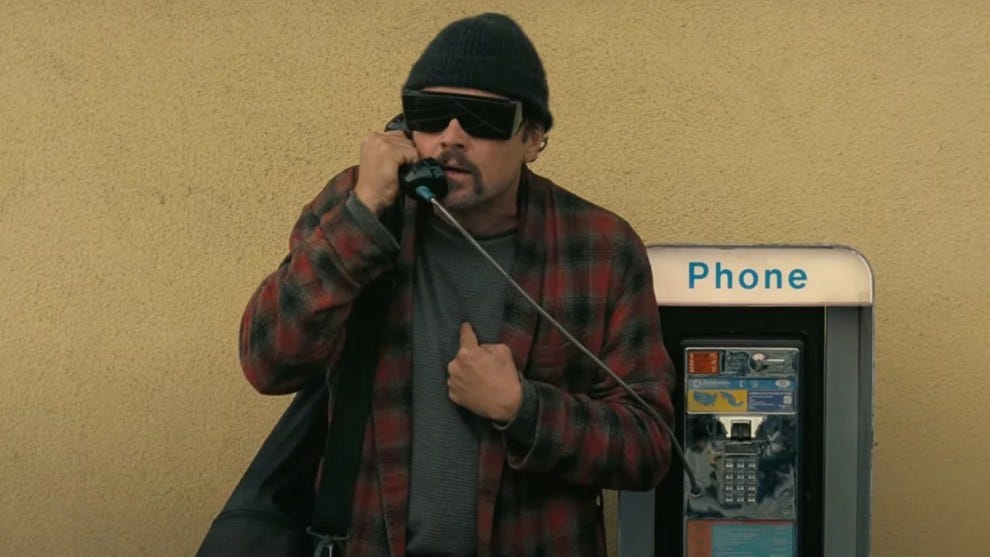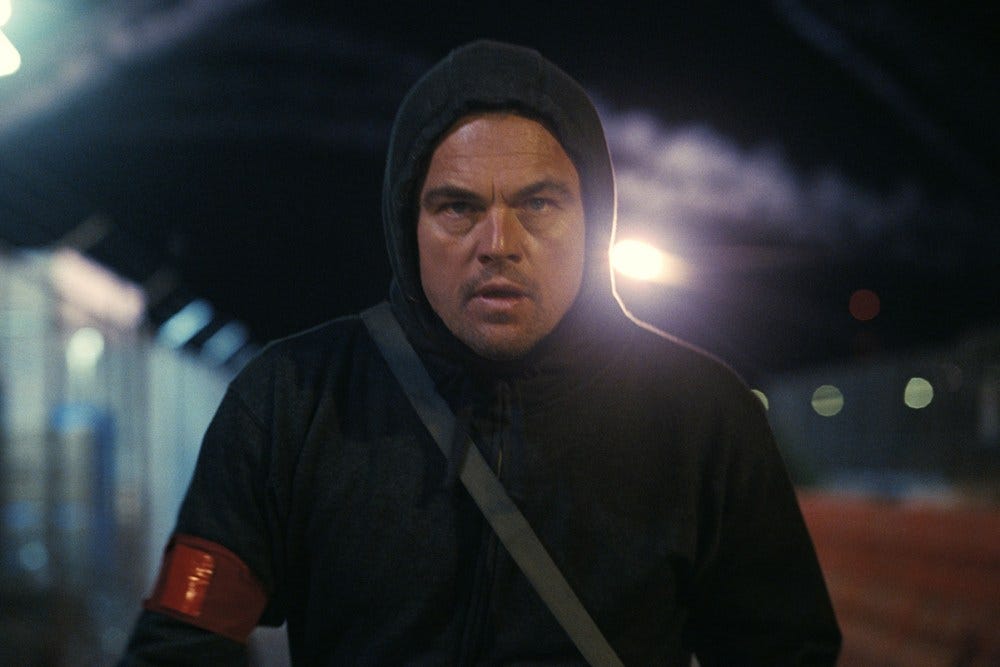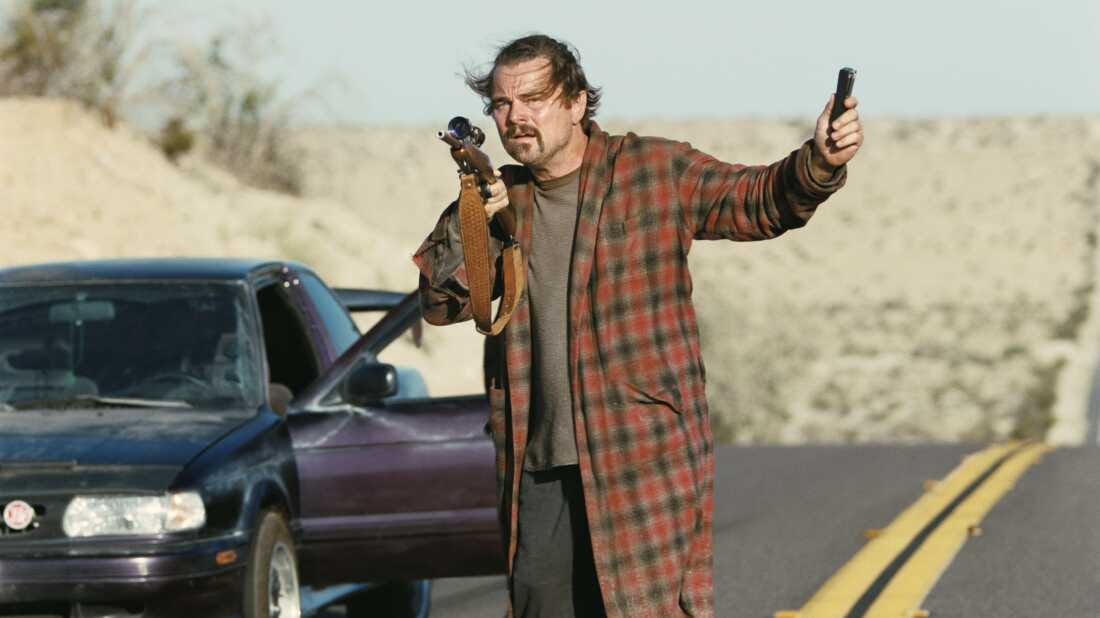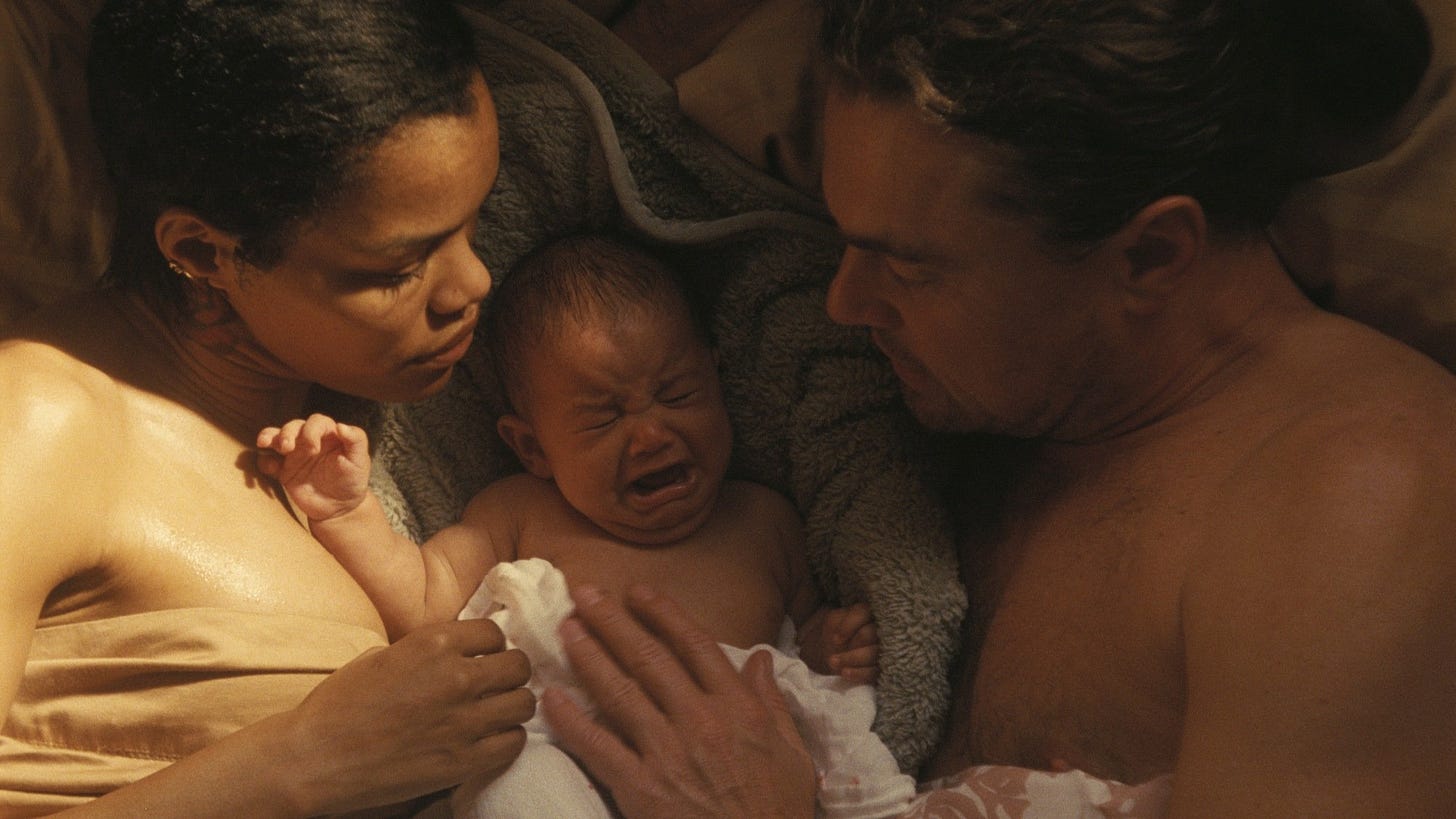Notebook: One Battle After Another (Paul Thomas Anderson)
Stray thoughts on one of the year's major films
I wasn’t initially planning on writing about One Battle After Another, but it’s been rattling around in my head all weekend. Not doing a formal review, but maybe you’ll get something out of this semi-organized collection of notes.
In general, I think Paul Thomas Anderson is a director who is great at painting in broad strokes, excelling when he’s depicting collectives and foils that can stand up to his insistently grandiose formal gestures. In my mind, the representative film is Magnolia, which soars through its delirious extended montages that stitch disparate vignettes into a singular, tortured emotional arc, but falters once it needs to tie its loose ends, and each narrative ends up feeling thinly conceived. One Battle After Another is actually a similar film, rapturously introducing us to a leftist organization, the French 75, in an alternate, countercultural vision of the mid-2000s, before transitioning to a less successful familial drama.
The musical depiction of the French 75 is thrilling, in part because it presents the group’s actions as something hypnotic and sexy. If the film’s title carries an implied exhaustion, One Battle After Another’s prologue makes the continuous work of activism something endlessly intoxicating.
Much has been made of Sinners’ depiction of sex, and there’s a case to be made that OBAA’s focus on sexuality is just as impressive. Anderson makes sex something inherent to the 75’s cause because in its most idealistic state, it represents a form of human connection that brings the group closer together. This is obvious in the relationship that forms between Pat “Rocketman” Calhoun (Leonardo DiCaprio) and Perfidia Beverly Hills (Teyana Taylor), and years later, under the name Bob Ferguson, Calhoun forgets the French 75’s passcode, but remembers a friend’s sexual preferences.
The most interesting sexual relationship concerns Perfidia and the militaristic villain Steve Lockjaw (Sean Penn). His fetishization of and affection for the dominant Perfidia is an interesting setting for Anderson’s consistent interest in violent acts of romanticism. Early in the film, Perfidia tells the French 75 that her pussy is for war. While a very literal interpretation is shown in an instance where Perfidia weaponizes Lockjaw’s attraction towards her to escape a sticky situation, Lockjaw’s eventual care for Perfidia (look at the flowers he brings to her witness protection home), however misguided, represents a deviation from the structures of fascism. Lockjaw’s sexual tryst with Perfidia is unforgivable to the conspiratorial Epstein-coded Christmas Adventurers not just because of their virulent racism, but because it represents a hint of humanity that they can’t control. This apparent weakness to Lockjaw’s stringent code of white masculinity also informs his subsequent Terminator-esque quest to cleanse the evidence of his sexual desire, inciting the film’s central pursuit.
If anything, one of the film’s problems is that this thematic thread is quickly abandoned once the film shifts to the present day. Even its relationship to the discussion of parenthood/genetics seems haphazard. Willa’s grappling with the identity of her father is a throwaway, as is her processing of Perfidia’s betrayal. Perhaps there’s something to be made of the film’s black women transitioning from a hypersexual fetish to nuns, but I don’t think PTA adequately explores this either. Everything in the film is subsumed by its motion.The cognitive dissonance of the initial time period is a choice that I remain somewhat conflicted about. On one hand, the recognizable imagery of immigrants in cages is a statement about how issues that may seem uniquely contemporary have been going on for much longer, there’s a fantastical nature to the prologue that’s as seductive as it is distancing. This comes from Pynchon, and the characters’ romantic memories, but I think the film loses something in this gloss. The group’s direct action as aesthetic marker. Perfidia’s threats to politicians are made feel like slogans in Anderson’s lilting montage, and when other characters espouse their political philosophies, it doesn’t feel as if the film takes it seriously.
The most compelling tension generated by the time period is that it connects to the film juxtaposition of collective movement versus individual stasis. If Perfidia’s ratting out of the French 75 is ultimately treated kindly, it’s because it not only shows us that every other revolutionary separated from the safety of community as an information leak, but also because she keeps moving, fleeing to the Southern border to continue her activism. She’s not suited for domesticity, whereas Pat, who never seemed quite as invested in the cause, uses it as an excuse to suspend himself in time, isolating himself from his network of activists.
The most moving moment in the film is the cut from Pat and Perfidia’s baby, Charlene, nestled in the backseat of a car as she and her father flee to Baktan Cross, California after Perfidia’s capture, to 16 years later, where Charlene, now going by Willa, practices Karate with her Sensei Sergio (Benicio Del Toro). The emotion is in the immediate release of attention (thank you Steely Dan!) and the tenuous passage of time. While voice-over tells us that 16 years later, everything has largely stayed the same, Willa’s face exposes the sentiment as complacent fantasy. Pat, now Bob, used his parental responsibilities to abdicate his societal investment. Although he forbids Willa to use a phone for reasonable safety precautions, his technological ineptitude is also a sign that the world has left him behind. Resting on his historical bona fides, he’s the guy who’s sitting on his couch watching The Battle of Algiers instead of actually being out in the field.
In many ways, the issues the current generation of revolutionaries are exactly the same, but the difference is also an individual one for Pat, who has become a barely-functional stoner and alcoholic. When the revolutionaries alert him to Lockjaw’s murderous inquisition, one of Pat’s more embarrassing revelations is that his former colleagues all remained devoted to the cause.As much as the French 75’s downfall is facilitated by Perfidia’s betrayal, the film places much more emphasis on her shooting of a black man in the bank. It’s a moment she clearly regrets, and I think there’s something to be made of how she begs the man to stop, shooting him as if on protocol. That racial breach, and the killing of someone who isn’t associated with federal forces is what upends the group’s coordination.
It’s also notable that this is one of the few glimpses we get into Perfidia’s psychology. During the prologue, we understand Perfidia primarily through Pat, and especially Lockjaw, ours and PTA’s surrogate in this BDSM relationship. We never begin to understand why she would engage with Lockjaw, or how she feels about her daughter’s ambiguous parentage. Her internal frustrations are given a few lines of voice-over as her character is off-screen. Perfidia’s existence as a sexual fantasy is emblematic of the prologue as a whole.My primary hangup with One Battle After Another is that its depiction of collective action is so powerful that it never adequately sets up the characters it expects us to ultimately focus on as individuals. Perfidia is a compelling screen presence, but what’s so impressive about her introduction is that she’s still just another member of a team. Her relationship to motherhood is shown as deeply ambivalent, but relatively under-explored, so when she disappears, her absence lacks emotional heft, even though it drives many of the film’s pivotal sequences.
A similar superficiality undercuts the character relations formed between black women at the Sacred Beaver sanctuary. References to Perfidia, and Willa’s questions about her family history, are generally weightless, and the re-introduction to former French 75 member Deandra, assumes a connection that’s not there.
The most frustrating relationships are the two father-daughter connections. Steve Lockjaw and Bob Ferguson are types more than anything, representing two very different, but destructive forms of masculinity. The broad performances by Penn and DiCaprio smother any emotional intimacy. I found DiCaprio’s performance especially troubling. For every moment where he comments on not being able to do his daughter’s hair, there are three or four of him maniacally screaming into the phone while pounding down a beer. This isn’t a problem in and of itself, but the tone of these antics is primarily comedic (and just not my sensibility), completely undercutting any sense of desperation he has towards finding his daughter, or any residual resignation surrounding his past as a revolutionary (I did not feel like his addiction was real/taken seriously at all). The most disappointing character is Lockjaw, who transforms from the film’s most complex character to arguably its least.
One Battle After Another is so committed to its narrative momentum that I frankly wonder if I’m misreading it by thinking it wants to be a character-driven piece. At almost every moment, Anderson de-centers character interiority in favor of keeping up the pace of the film. While in theory the propulsive motion should play off of Bob’s stasis and Willa’s revolutionary spark, the film sets up a fundamental conflict between character and form that (to me) feels unintentional. This could be a concession to the blockbuster budget, but the result seems blatantly superficial.Because the film is so devoted to its forward motion, the best passages from the post time-jump stretch are also mostly formal, thematizing the kineticism that Pat has forsaken and Willa is discovering. Anderson’s crosscutting is as rhythmic and propulsive as it’s ever been, so he effortlessly creates a feeling of breathless pursuit, even when we’re watching Lockjaw perform a paternity test in an empty church.
This kineticism is very expressive, and inflects the serpentine narrative, which prefaces its twists and turns with acts of solidarity. Bob’s escape from Baktan cross is coordinated through a safe haven for Latin American immigrants, parkour with a group of teenagers, and the help of doctors planted in the carceral system. Anderson’s virtuosic long-takes create the feeling of a sprawling network of activists, and the excitement of this mass community mobilization is inspiring.
The solidarity is pointedly contrasted with the hierarchical structure of the Christmas Adventurers, whose corporate aspirations result in a virulent strain of American individualism. This is what ultimately results in Steve Lockjaw’s downfall when the Adventurers send another hopeful initiate to clean up Lockjaw’s mess.The other highlight of One Battle is a climactic car chase where the topography of the road makes it such that the future dips in and out of sight. It’s a simple metaphor that’s flawlessly executed, where the thread of narrative context (a monster chasing a daughter, a father chasing a monster) grants a beautiful image emotional urgency.
If anything, I found the Christmas Adventurers a bit tiring. The connections between the military, Christian nationalism, corporate bureaucrats, and fascism are obvious now. Maybe this is another artifact of Pynchon, but when every moment onscreen is a one-dimensional joke, it becomes tiring after the fourth or fifth scene (probably a comedic sensibility mismatch here too).
The ending also presents something of a problem. As previously, the emotional weight of Perfidia’s letter is largely abstract (and given all of maybe 5 seconds). It’s implied that in addition to her experience throughout the film, it’s this letter that inspires Willa to commit herself to revolution. This is just another instance where character drama bumps up against narrative momentum. Because of the film’s breakneck construction and the abstraction of the film’s chase away from the cause of the French 75, Willa’s decision to participate doesn’t feel rooted in any actual political beliefs. The use of Tom Petty’s American Girl only accentuates the feeling that the film ends by chasing an aesthetic, one that PTA makes a point of depicting as white, masculine fantasy.
What’s more interesting is Bob’s decision to stay at home. His decision to buy an iPhone represents a willingness to engage with contemporary society, but his decision to stay home when all of his contemporaries are still fighting is treated with the utmost care. If anything, the film is too nice to Bob. His resignation is meant to be loveable, and PTA actively avoids considering the character’s moral ambiguities. I don’t necessarily have an issue with the ending being a father recognizing that his best years are behind him passed off as political call-to-action, but as someone who found OBAA’s familial drama subpar, it’s a frustrating final note.





